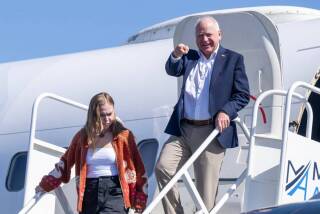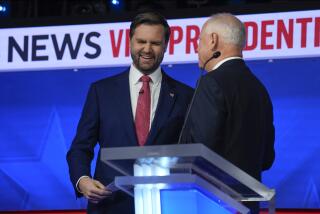Liberal Challenger, Once Way Behind, Makes a Race of It in Minnesota : Senate: Democrat Paul Wellstone closes in on Rudy Boschwitz, the GOP incumbent. He is aided by a scandal and the recent federal budget hassle.
MINNEAPOLIS — Aided by a divisive Republican scandal and the protracted hassle over the federal budget, long-shot Democratic candidate Paul Wellstone is turning Minnesota’s U.S. Senate race into a knock-down, drag-out battle over national economic policy.
Alarmed at the dwindling of his once formidable lead, two-term Republican incumbent Rudy Boschwitz, an ardent defender of Reaganomics, last week fired a double-barreled blast at his liberal challenger, seeking to depict him as a radical, outside what Boschwitz’s strategists call “the mainstream.”
At a press conference in Mankato, Boschwitz brought up the fact that Wellstone had been arrested four years ago during a bank protest against farm foreclosures. “While he was out there huffing about protesting and getting himself jailed, we (in Congress) fixed up the farm credit system,” Boschwitz said.
Meanwhile, new Boschwitz television commercials charge that Wellstone’s proposals for expanded government action on the environment, child care, health care and the like would cost “more than the entire national debt” requiring “hundreds of billions of dollars in new taxes.”
But Wellstone, a 46-year-old Carleton college professor, whose candidacy few in his own party took seriously at first, seems undaunted. Boschwitz “does it all through money and attack ads,” he told several hundred fired-up supporters at a rally at the Ukranian-American Hall here. “But we got the people, we got the issues, we got the determination . . . and we’re going to win.”
Now that Boschwitz’s lead has narrowed--to only three points in the latest Minneapolis Star Tribune poll--national Democratic strategists see this contest as a chance to prove that their party’s claim to stand for economic fairness can overcome the traditional Republican arguments against big government and higher taxes.
But for all its far-reaching national significance, the issue debate in the Senate campaign has had a hard time competing for attention against the lurid revelations and intra-party backbiting stemming from the Republican gubernatorial campaign.
GOP candidate Jon Grunseth’s candidacy was staggered by charges that he enticed teen-age girls to swim in the nude with him at a pool party in his home in 1981. Those allegations were followed by charges from a woman who said she had an affair with him while he was married.
On Sunday, he dropped out of the race. The state GOP executive committee has the right to name a replacement candidate in the final days of the campaign.
But with popular GOP state Auditor Arne Carlson now staging a write-in campaign, Republicans believe that Democratic incumbent Rudy Perpich, once deemed highly vulnerable, will be difficult to beat.
Meanwhile Boschwitz’s own candidacy appears imperiled by the unfavorable publicity for the GOP from the Grunseth affair and by the ire of Grunseth’s supporters, incensed because Boschwitz joined in the effort to get their man out of the race in favor of Carlson.
The federal budget controversy has also hurt Boschwitz by keeping him off the campaign trail. Thus last Saturday he had to cancel a 10-hour, 15-stop bus tour through the Twin City suburbs so he could be on hand for the final Senate roll-call votes on the budget.
Dressed casually and with a folksy grin, the 59-year-old Boschwitz tried to make up time lost on the hustings by shaking hands with fellow Minnesotans on his flight back to Washington.
But the senator acknowledged that the budget debate has also hurt him substantively by highlighting the key Democratic argument of economic fairness. “They were able to make the rich versus poor argument,” Boschwitz said in an interview on the plane. “They demagogued it enough and they were able to make it stick.”
The Democratic cause was aided by the press, Boschwitz complained, but also, he acknowledged, by President Bush’s decision to break his campaign pledge to oppose any tax increase. “George Bush made a major mistake,” Boschwitz said.
Still Boschwitz does not believe the public is ready for Wellstone’s ideas for increased government activism. “I certainly don’t think people are looking for the quantity of government he wants to impose on them,” he said, “and they certainly are not prepared to pay for it.”
Boschwitz had no trouble finding adherents for his viewpoint among the businessmen on Northwest’s flight 158 for Washington last Saturday morning.
“He represents the freewheeling Minnesota style,” said Richard Mundinger, a process engineer with 3M in St. Paul, after shaking hands with Boschwitz. “I mean he’s open to business.”
Another passenger, Larry Brandenberger, a researcher with a Minneapolis paint company, considers himself a Democrat but said he finds it hard to accept Wellstone’s liberal activist approach. “I’m a little worried about him,” he said.
Still, Boschwitz has been showing signs of concern about Wellstone’s appeal, notably by casting his Senate vote to override President Bush’s veto of the civil rights bill last week after voting against the bill when it passed the Senate.
Boschwitz later explained that he decided to change his position after noticing that former Ku Klux Klan leader David Duke was watching from the Senate gallery and concluding that “it was important to send a message to Duke and to all others who spread racism and hatred that we will not tolerate those attitudes.”
But at the Ukranian-American Hall rally, former vice president Walter Mondale said it was fear of Wellstone, not of Duke, that made Boschwitz change his mind.
When Wellstone launched his candidacy, Mondale recalled, “ his polls were so bad you’d swear his own wife wouldn’t vote for him. Now he has a Republican senator so scared he votes one way one day and the other way the next day.”
Some national Democratic strategists fear that Wellstone will have trouble sustaining his momentum until Election Day because he is relatively unknown, having run for office only once before, in 1982 when he lost to Carlson.
Some also feel that his past record as a liberal activist could make him vulnerable to attacks from the Boschwitz campaign, which is expected to outspend Wellstone by seven to one.
In addition to his arrest for the farm foreclosure protest, Wellstone was arrested in a 1970 anti-Vietnam War demonstration. And he headed Jesse Jackson’s 1988 presidential campaign in Minnesota.
Still, Wellstone supporters believe the very fact that he is a fresh face on the political scene is helping his candidacy.
“He’s really of the liberal fringe element,” said Richard Miller, an investment banker and former Democratic city councilman who came to hear Wellstone at the Ukranian-American hall rally. “But he’s really caught on. He is a refreshing alternative to what we now have in Washington.”
Wellstone himself claims he is a candidate with ideas whose time has finally come.
“For a while Reagan had people marching to a 19th-Century tune, that there was nothing government could or should do,” he said in an interview. “But now people feel that what what we’ve done by wasting the environment is wrong. They feel we’ve abandoned our children and that’s wrong.
“I think people do believe there is an opportunity for a new world in the making. I think the ‘90s is going to be a very different decade from the ‘80s.”
More to Read
Get the L.A. Times Politics newsletter
Deeply reported insights into legislation, politics and policy from Sacramento, Washington and beyond. In your inbox three times per week.
You may occasionally receive promotional content from the Los Angeles Times.










